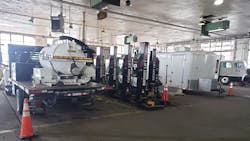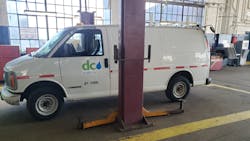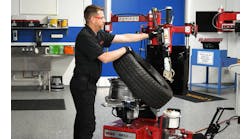The challenges of managing and maintaining a very diverse fleet of 635 vehicles and 1,300 pieces of equipment are many, noted Timothy Fitzgerald, fleet director at DC Water (the District of Columbia Water and Sewer Authority) Department of Fleet Management. At the same time, the veteran fleet executive was quick to point out a number of ways that the operation effectively addresses those challenges through innovation, the integration of technology, and the creation of a culture focused on success.
“The first step is to customize the fleet to fit the business we’re in so the right vehicles are on the road, and the right tools are in the right hands,” Fitzgerald stated. “We look to our vendors to work smarter when they respond to our needs as an enterprise.”
The department relies on its vehicles to be properly maintained and ready to serve the residents of the nation’s capital and surrounding areas. DC Water distributes drinking water and collects and treats wastewater for more than 700,000 residents and 17.8 million annual visitors in the District of Columbia and provides wastewater treatment services in neighboring counties in Maryland and Virginia. It operates more than 1,350 miles of pipe, four pumping stations, five reservoirs, four elevated water storage tanks, 43,860 valves and 9,500 public hydrants as well as 1,800 miles of sanitary and combined sewers, 22 flow-metering stations, and nine off-site wastewater pumping stations.“We also rely heavily on data to score everything we do so we can make good decisions,” Fitzgerald noted.
Much of the information that the department’s fleet relies on comes from its Chevin FleetWave fleet management software. The ability to use data to improve the fleet and its maintenance provides valuable insight, Fitzgerald related. This enables them to not only analyze and control operations, but also fosters an environment where everyone understands processes.
“That leads to a team who champions improvements by always thinking about creative and innovative ideas,” Fitzgerald continued. “With the rapid integration of vehicle, equipment and maintenance technology today, a mindset that sees its importance is a foundation of being able to do things not only faster, but more efficiently and effectively as well.”
For DC Water, integrated technology and on-board telematics systems in particular are providing real time information not available before. Currently, the operation is evaluating Solar Telematics and an embedded open architecture with Ford and General Motors. The fleet is also currently evaluating mobility applications and a range of sensor-driven systems.
Through more informed reporting, according to Fitzgerald, the fleet’s managers can use accurate KPIs to make more effective decisions from the start. “It can be overwhelming when there is a lot of data coming in from different sources,” he admits, “but if you prioritize the types of data based on what’s most important, you’ll have accurate information for addressing your pain points. From there, it’s much easier to be smarter about how you spec, use, and maintain equipment—and for developing a plan for the future.”
Equally essential in Fitzgerald’s mind is a focus on people. “We strive to develop our existing staff, and young people to make the industry more attractive to them,” he said. “For example, we have an apprenticeship program in partnership with DC Water Works and the District of Columbia that is successfully training young men and women in the dynamics of fleet management.”
Sustainability has also become an area of focus. Some years ago, DC Water challenged its user departments to explore, devise and implement plans to utilize more environmentally friendly products and technologies. The fleet operation is also responsible for meeting federal and local alternative fuel and electrification mandates.
The Department Fleet Management accepted the challenge and began using several bio-based products with great success, Fitzgerald reported. Some of those used in its maintenance operation include Soy Scrub, EP Lube Grease, adhesive remover, hydraulic fluid, and Envirologic 802 Grease. They have also continued testing and using biodegradable oil from Biosynthetic Technologies, which has shown increased longevity and stability over time.
“There are infinite possibilities if you are willing to dig deep, adapt and adjust,” Fitzgerald said. “That’s why we actively seek out creative and innovative ideas from our own people and our suppliers. When you do that, you drive and stimulate thinking and get a real outcome. In the Department of Fleet Management at DC Water we see doing things smartly as our responsibility.”






